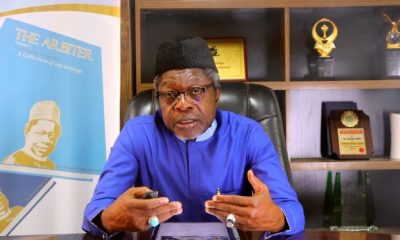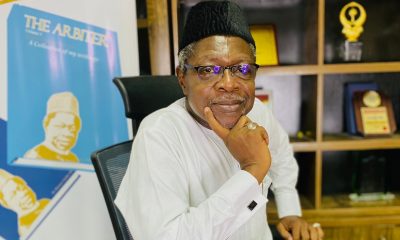OIL AND GAS
Kyari, refineries and a green ribbon, by KEN UGBECHIE
Kyari, refineries and a green ribbon, by KEN UGBECHIE
Mele Kyari, a geologist and Group CEO of the Nigerian National Petroleum Company Limited (NNPCL), has dug his way into the tunnel of history.

Within a space of two months, he announced the successful revamp of two refineries.
In November 2024, Port Harcourt refinery came on stream. The following month, December, Warri refinery burst back to life. Both are not performing optimally, yet. But the journey has only just begun. Kaduna refinery is projected to begin production later this year.
And if all goes well, a substantial percentage of the nation’s local petrol consumption would be sourced in-country. The implication on forex, job creation and economic reflation is enormous, positively.
So what? Some Nigerians have asked this question.
I won’t even tag them naysayers. There is a tincture of justification in their rage. But if such Nigerians did not rage against those who in the past brought the refineries – Port Harcourt, Warri and Kaduna – to ruins, they should not shudder at the celebratory dance of President Bola Tinubu and his laudation of Kyari and his team for achieving both the improbable and the impossible.
After many years of redundancy, after several failed attempts to restream the moribund refineries with billions of dollars wasted in the fitful misadventures, someone has finally belled the cat.
Such a person deserves a worthy pat on the back.
Little wonder, President Tinubu was gushing at the news of Warri refinery cracking back to life. Here, I salute the wisdom of Tinubu in keeping Kyari on his job. Against a crude and virulently malicious campaign to get Kyari out of the way, Tinubu ignored the mob and renewed Kyari’s tenure. One of the missteps of the past was a high and volatile turnover of leadership at the nation’s oil and gas behemoth. Commonsense management will tell you that job insecurity, at any level, is antithetical to sustainable planning for long term goals.
Fixing a refinery, especially one that has been rendered comatose for many years (with some bolts and parts gone rusty) is not a one-hour flight. It’s a long-distance haul, requiring patience, precision and meticulous planning.
Had Kyari been shoved aside to fit the script of his ‘enemies’ and political mandarins seeking to give ‘wise’ counsel to Tinubu, these refineries would never have come on stream.
In the stereotypical Nigerian way, the new management would have reviewed the contract, reworked the papers and even re-awarded aspects of the contract to another corporate.
Herein is the wisdom of Tinubu in retaining Kyari highly commendable.
As more Nigerians push for the refineries to attain 100 percent production efficiency, it is apposite to state what Kyari did differently. How did Kyari succeed where many others in the past failed woefully?
Dateline: October 21, 2021, NAF Conference centre, Abuja: Kyari was Special Guest of Honour at the All Nigeria Editors’ Conference.
He spoke off the cuff on the subject, “Insecurity as it affects the Oil and Gas sector.” He showed a good grasp of the malaise that has afflicted the Nigerian oil and gas industry. He, however, raised a banner of hope that under his watch, “things are now done differently.” He said issues of refineries not working, crude oil theft, among others, are all traceable to the Nigerian elite which include the editors and everyone present at the event.
Kyari said that refineries had become comatose because the leadership elite had been doing things the wrong way over the years by relying on the builders of the refineries to come to Nigeria to fix the refineries.
This model, he explained, does not happen anywhere because there are specialists whose business is to fix such refineries. They are not the builders but their job is to fix them when they break down.
He called such companies EPCs (Engineering, Procurement and Construction). He gave an analogy: “You cannot ask Toyota to come down to Nigeria to fix your Toyota car. You give it to a technician. This is the error we have been repeating over the years.”
He credited President Muhammadu Buhari for giving his management the free hand to do the right thing. “This is the first time in history that NNPC and its subsidiaries are allowed to do things the way things should be done. Now, I can confirm to you that we have taken responsibility and we will fix the refineries.
We have started the process, contractors have been mobilised to the Port Harcourt refinery, while the same process for Warri and Kaduna refineries will be concluded by the end of this year,” he told a now excited crowd of over 200 editors, representatives of several government agencies including security agencies and the private sector.
He got a standing ovation afterwards.
Fast forward. Three years later at the twilight of 2024, two of the refineries had become operational once again all because Kyari walked a different path. It’s no magic. Just focussed, honest leadership. Kyari had been sincere as the helmsman of the NNPC even to his own hurt. The first NNPC honcho to open the ledger for public scrutiny. He did not only audit NNPC accounts, he got them published. And for once in ages, Nigerians got to know the assets, liabilities, strength and weaknesses of the company they own. Kyari has shown that he is a different breed of leader, a transformational leader who has used the same personnel at NNPC, in the same country, against the same headwinds to achieve milestones, some once thought unattainable.
Retaining Kyari, a man he did not appoint, is one of the smartest decisions of President Tinubu.
Kyari bestrides two worlds in Nigeria’s oil and gas history. The pre-PIA (Petroleum Industry Act) and the post-PIA, a delicate transition that required experience, emotional intelligence, industry knowledge, and leadership savvy. If the transition was a kind of exam for him, the geologist, earth scientist of crude oil marketer of renown simply aced it. He proved one thing: Nigeria’s challenges can be surmounted by Nigerians.
He deserves all the Presidential plaudits and a green ribbon around his neck as a memorial of national honour.




